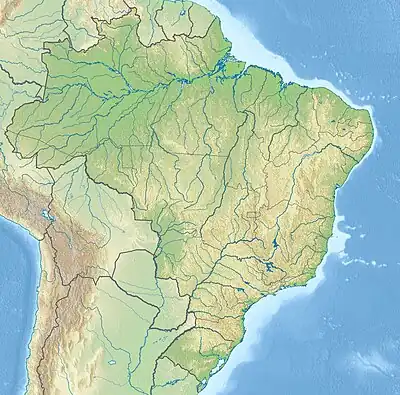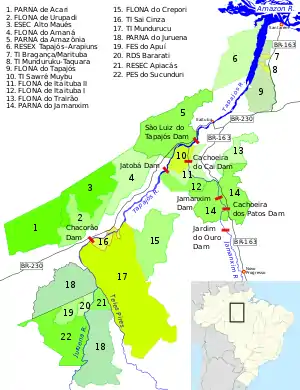Cachoeira do Cai Dam
The Cachoeira do Cai Dam (Portuguese: Barragem de Cachoeira do Cai}) is a planned hydroelectric dam on the Jamanxim River in the state of Pará, Brazil, with a capacity of 802 megawatts (1,075,000 hp).
| Cachoeira do Cai Dam | |
|---|---|
 Location of Cachoeira do Cai Dam in Brazil | |
| Official name | Barragem de Cachoeira do Cai |
| Country | Brazil |
| Coordinates | 4.998491°S 56.455739°W |
| Purpose | Hydroelectric |
| Status | Planned |
| Dam and spillways | |
| Impounds | Jamanxim River |
| Reservoir | |
| Surface area | 42,000 hectares (100,000 acres) |
| Installed capacity | 802 megawatts (1,075,000 hp) |
Location

The Cachoeira do Cai Dam is proposed to be built on the Jamanxim River in the state of Pará, in the Tapajós river basin.[1] It would adjoin the Sawré Muybu Indigenous Territory, which lies between the Jamanxim and the Tapajós in the region above the point where the two rivers converge.[2] The hydroelectric power plant would be part of the proposed 12,000 megawatts (16,000,000 hp) Tapajós hydroelectric complex on the Tapajós and Jamanxim rivers.[3] Others are the São Luiz do Tapajós (6,133 MW), Jatobá (2,338 MW), Cachoeira dos Patos (528 MW) and Jamanxim (881 MW), all under study, as well as the less advanced proposals for the Jardim do Ouro (227 MW) and Chacorão (3,336 MW).[4]
Technical
The project is a joint venture of Eletrobras, Eletronorte, Construções e Comércio Camargo Côrrea, EDF Consultoria em Projetos de Geração de Energia, EPP Energia Elétrica and Promoção e Participações. The project is estimated to cost US$1.1 billion. The reservoir would have an area of 42,000 hectares (100,000 acres).[1] The plant would have a capacity of 802 megawatts (1,075,000 hp).[1]
A "platform" approach is proposed for construction to minimise environmental impact. There would be no access roads, and workers would be taken to the site by helicopter. After construction is complete the site would be regenerated.[5]
Impact
The reservoir would flood 15,690 hectares (38,800 acres) of the Jamanxim National Park, 6,800 hectares (17,000 acres) of the Itaituba I National Forest and 20,470 hectares (50,600 acres) of the Itaituba II National Forest.[6] The official estimate is that 150 people will be affected.[1] A study released in December 2015 took into account carbon and methane emissions from the reservoir and from construction and concluded that there was a high probability that the plant would generate emissions comparable to a natural gas plant, and a possibility that emissions could exceed those of a coal-fired plant.[7]
Notes
- Cachoeira do Caí Perfil da usina – Barragens na Amazonia.
- Fonseca, Bruno (6 January 2015), "Battle for the Tapajós: Brazil's Construction of Hydroelectric Dams Threatens the Munduruku People", Amazon Watch, retrieved 2017-02-16
- Brazil sets concession auction for 8,040-MW Sao Luiz do Tapajos...
- Jatobá Perfil da usina –Barragens na Amazônia.
- Tapajós Basin Dams – International Rivers.
- Switkes 2009.
- Fellet 2016.
Sources
- "Brazil sets concession auction for 8,040-MW Sao Luiz do Tapajos hydro project", Hydro World, Brasilia: PennWell Corporation, 17 September 2014, retrieved 2017-02-13
- "Cachoeira do Caí Perfil da usina", Barragens na Amazonia (in Portuguese), retrieved 2017-02-14
- Fellet, João (12 January 2016), "Estudo alerta para emissões de novas hidrelétricas na Amazônia", BBC Brasil, Washington, retrieved 2017-02-14
- "Jatobá Perfil da usina", Barragens na Amazônia (in Portuguese), archived from the original on 2017-12-31, retrieved 2017-02-13
- Switkes, Glenn (5 June 2009), "Relatório Preliminar sobre o Inventário Hidrelétrico da Bacia do Tapajós", International Riverd (in Portuguese), retrieved 2017-02-14
- "Tapajós Basin Dams", International Rivers, retrieved 2017-02-13